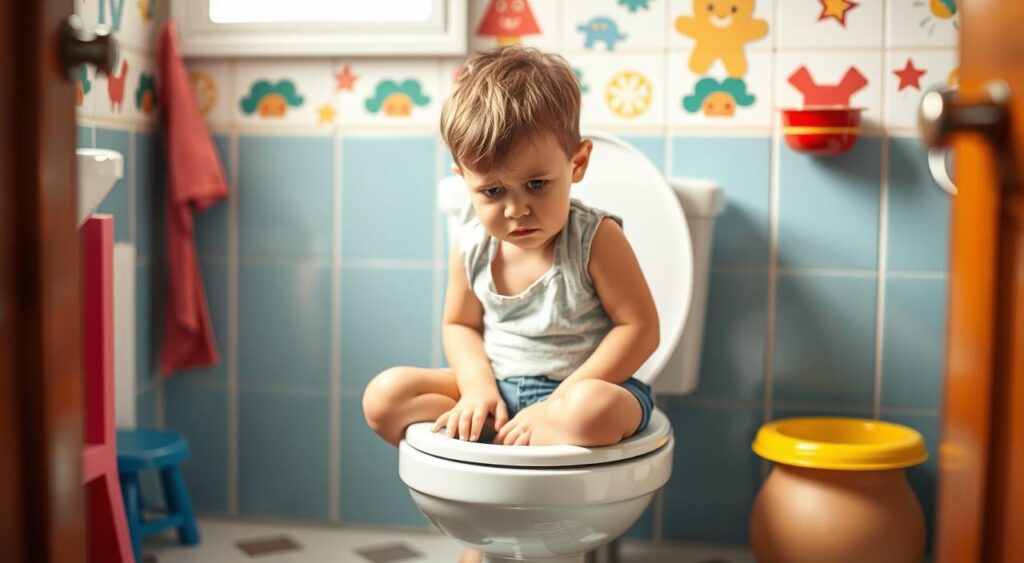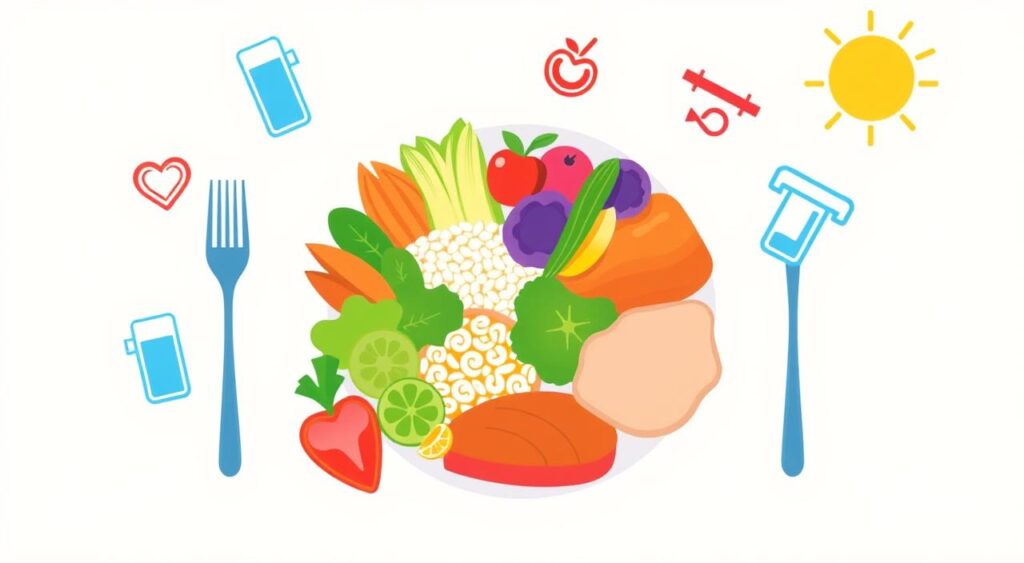Struggling with encopresis? This informative guide explains what it is, the underlying causes, and proven strategies to effectively manage this common childhood issue.
About 1 in 100 kids deal with encopresis. It’s when they have bowel movements without control. This can really affect a child’s life, making them feel sad and lonely.
It’s important to know about encopresis to help manage it. It often comes from constipation. Spotting the signs early can help a child feel better and control their bowel movements.

Dealing with encopresis needs a big plan. This includes seeing a doctor, changing what they eat, and learning new habits. With the right help, kids can feel better and live a happier life.
Key Takeaways
- Encopresis affects 1 in 100 children in the United States
- Childhood constipation is a common underlying cause of encopresis
- Fecal incontinence is a significant symptom of encopresis
- Early recognition and intervention are critical for effective management
- A comprehensive approach, including medical evaluation and behavioral modification, is necessary for managing encopresis
- Dietary changes can help alleviate symptoms of encopresis and childhood constipation
Understanding Encopresis: A Comprehensive Overview
Encopresis is when a child passes stool without control. It falls under elimination disorders. It mainly hits kids who often get constipated. Knowing what it is, how it’s classified, and who it affects is key.
The causes of encopresis are varied. It often starts with constipation. This leads to stool building up and then passing without control. The symptoms of encopresis include soiling, constipation, and stomach pain.
Definition and Medical Classification
Encopresis needs special care, like diet changes and bowel training. Understanding it helps families find ways to manage it. This way, they can improve the child’s life.
Who Is Most Commonly Affected
Children with encopresis face many challenges. It can hurt their self-esteem and friendships. It’s crucial to offer support and help them feel better.
Impact on Daily Life
In summary, encopresis is a serious issue that needs a full approach. By knowing its causes and symptoms, families can help manage it. This improves the child’s life and well-being.
Common Causes and Risk Factors
Childhood constipation is a main reason for encopresis, affecting how well the body moves waste. Diet and how much physical activity a child gets also play a part. Some medical issues, like problems with the gut or brain, can raise the risk of encopresis too.
Some key factors that can contribute to encopresis include:
- Diet: A low-fiber diet or not drinking enough water can cause constipation and encopresis.
- Physical activity: Not moving enough can slow down bowel movements, making constipation and encopresis more likely.
- Medical conditions: Certain health issues, such as gut problems or brain disorders, can affect bowel movements and increase the risk of encopresis.
Knowing what causes and increases the risk of encopresis is key to preventing and managing it. By changing lifestyle habits, like eating more fiber and being more active, people can lower their risk of getting encopresis.
It’s important to notice the signs of encopresis, like changes in bowel movements, belly pain, and changes in behavior. Getting medical help and making lifestyle changes can help manage encopresis and improve digestive health.
Recognizing the Signs and Symptoms
Encopresis can be hard to spot early on. Knowing the common signs helps families get help fast. Soiled underwear is a big problem for those affected.
Other signs include stomach pain, constipation, and bowel blockages. People with encopresis might also avoid friends because they’re scared of accidents. This can make them feel lonely and not good about themselves.
Physical Symptoms
Some common physical symptoms of encopresis include:
- Soiled clothing or underwear
- Abdominal pain or discomfort
- Constipation or bowel obstruction
Behavioral Indicators
Behavioral signs of encopresis may include:
- Avoidance of social interactions or activities due to fear of accidents
- Withdrawal from friends and family
- Low self-esteem or feelings of embarrassment
Spotting these signs is key to getting treatment for encopresis. It helps improve life for those with the condition. Knowing the symptoms is the first step to seeking help and finding effective treatment.
The Connection Between Constipation and Encopresis
Constipation is common in kids and can cause them to lose control over their bowel movements. This can make kids feel ashamed and embarrassed. Encopresis is when kids have repeated episodes of losing control over their bowel movements, often because of constipation.
Constipation can make kids afraid to go to the bathroom, leading to more constipation and losing control. To stop this cycle, it’s important to treat constipation and fecal incontinence. This includes medical treatment, changing what they eat, and changing their behavior.

Here are some ways to manage constipation and fecal incontinence in kids:
- Eat more fiber from fruits, veggies, and whole grains
- Go to the bathroom at the same time every day
- Use laxatives or stool softeners as a doctor suggests
- Keep clean to avoid infections
By tackling constipation and fecal incontinence, parents can help kids feel better emotionally and physically. With the right help, kids can learn to control their bowel movements and feel more confident in their bodies.
| Condition | Description |
|---|---|
| Childhood Constipation | A condition characterized by infrequent or difficult bowel movements |
| Fecal Incontinence | A condition characterized by the loss of control over bowel movements |
| Encopresis | A condition characterized by repeated episodes of fecal incontinence |
Diagnostic Process and Medical Evaluation
Diagnosing encopresis starts with a detailed medical check-up. This helps find any physical issues that might be causing the problem. A thorough physical exam is the first step.
Looking at the child’s medical history is also key. It helps doctors find any health issues that could be linked to encopresis. They check the child’s bowel habits, diet, and past treatments.
Diagnostic Tests
At times, tests are needed to confirm encopresis and rule out other causes. These tests might include:
- Imaging studies, like X-rays or ultrasound, to check the child’s bowel movements and look for blockages
- Lab tests, such as stool samples or blood work, to check for underlying health issues
- Colonoscopy or sigmoidoscopy to examine the child’s colon and rectum
After confirming the diagnosis, doctors create a treatment plan. This plan may include medical treatments, dietary changes, and behavioral therapies. These help the child develop good bowel habits and avoid accidents.
With the right treatment plan and support from healthcare providers, kids with encopresis can manage their condition. This improves their quality of life.
Treatment Approaches for Encopresis
Effective treatment for encopresis combines medical, behavioral, and dietary steps. The main goal is to make bowel movements regular and stop fecal incontinence.
A good plan for treatment for encopresis might include:
- Medical steps to fight constipation and keep bowel movements regular
- Behavioral therapy to help make bowel movements a habit
- Changes in diet to keep the bowels healthy and avoid constipation
Working with a healthcare expert is key to making a management of encopresis plan that fits you. By mixing medical, behavioral, and dietary steps, people with encopresis can manage their symptoms and live better.
With the right treatment for encopresis and management of encopresis plans, people can beat encopresis. They can keep their bowels healthy for a long time.
| Treatment Approach | Description |
|---|---|
| Medical Interventions | Address constipation and promote bowel regularity |
| Behavioral Therapy | Encourage regular bowel movements and establish healthy bowel habits |
| Dietary Changes | Promote bowel health and prevent constipation |
Behavioral Modification Strategies
Behavioral therapy for encopresis is key in managing the condition. It focuses on changing habits and behaviors that lead to it. A daily routine is important, and behavioral modification helps a lot. It makes it easier to manage bowel movements by setting a schedule.
In managing encopresis, positive reinforcement is crucial. It encourages good behaviors like regular bowel movements. Rewards like praise or stickers help build confidence and motivation.
Family Support Methods
Family support is essential in managing encopresis. Working together, family members can help with routines, emotional support, and positive behaviors. Some effective methods include:
- Creating a bowel movement chart to track progress
- Encouraging open communication about bowel movements and accidents
- Providing emotional support and reassurance
By using these strategies, individuals with encopresis can manage their condition better. Behavioral therapy for encopresis is a long-term effort. It needs patience, dedication, and support from family and healthcare professionals.
| Strategy | Description |
|---|---|
| Establishing Toilet Routines | Creating a daily schedule for bowel movements |
| Positive Reinforcement Techniques | Encouraging desired behaviors with rewards and praise |
| Family Support Methods | Providing emotional support and encouragement |
Dietary and Lifestyle Changes
Managing encopresis needs a full approach, including diet and lifestyle changes. A balanced diet is key for healthy bowel movements. Eating more fiber helps avoid childhood constipation, a big cause of encopresis.
Drinking enough water is also important to stop constipation and keep bowel movements regular. Playing outside or doing sports helps move things along and boosts digestive health.
- Eat a balanced diet rich in fiber, fruits, and vegetables
- Stay hydrated by drinking plenty of water
- Engage in regular physical activity to stimulate bowel movements
By changing what you eat and how you live, you can manage encopresis better. It’s vital to work with a healthcare expert. They can help create a plan that tackles the root causes of encopresis and supports healthy bowel movements.

Supporting Your Child’s Emotional Well-being
Encopresis can really affect a child’s emotional health. It’s key to offer support and guidance. Using behavioral therapy can help kids develop good bowel habits and feel better overall.
Children with encopresis might feel ashamed, guilty, or embarrassed. These feelings can hurt their self-esteem and how they interact with others. Parents and caregivers can help by encouraging open communication. They should create a safe space where kids can share their feelings without fear.
Addressing School Concerns
School can be tough for kids with encopresis. It’s important to tackle any school-related issues. Parents and caregivers should work with teachers to find solutions. This might mean getting extra help or special arrangements, like easy bathroom access.
Building Self-esteem
Boosting self-esteem is crucial for kids with encopresis. It can be done by praising their strengths and successes. Parents and caregivers should focus on what their child does well. This helps build confidence and a positive self-image.
Family Counseling Options
Family counseling can really help kids with encopresis and their families. A therapist can help develop strategies for managing the condition. They can also address any emotional or psychological issues. Behavioral therapy is a big part of this, teaching families how to cope and improve their lives.
Conclusion: Moving Forward with Hope and Support
Children with encopresis can live normal, healthy lives with the right approach. Managing encopresis requires a mix of medical treatment, lifestyle changes, and emotional support. Understanding the condition helps families work together to face its challenges.
Encopresis is treatable, and with the right care, children can overcome its physical and emotional hurdles. A supportive and non-judgmental attitude helps children feel confident and valued. A team effort between healthcare professionals, family, and the child is key to a successful treatment plan.
Creating a nurturing environment and ensuring access to medical care helps children manage encopresis. With patience, understanding, and support, children with encopresis can become happy, healthy adults. We hope our discussion on encopresis has been helpful and inspiring for families dealing with this condition.
FAQ
Q: What is encopresis and how is it related to childhood constipation?
A: Encopresis is when kids have bowel movements they can’t control. It often happens because of constipation. So, treating constipation is key to managing encopresis.
Q: What are the common causes of encopresis and how can they be prevented?
A: Causes of encopresis include constipation, diet, and physical activity. To prevent it, eat well, drink enough water, and stay active.
Q: What are the symptoms of encopresis and how can they be recognized?
A: Signs of encopresis are soiled underwear and avoiding friends. Kids might also have belly pain. Spotting these signs early is important for treatment.
Q: What is the connection between constipation and encopresis?
A: Constipation often leads to encopresis. To manage encopresis, you need to tackle constipation. This can be done through diet, lifestyle changes, and medical help.
Q: What are the treatment options for encopresis and how do they work?
A: Treatments for encopresis include medicine, behavior therapy, and diet changes. Therapy helps kids go to the bathroom regularly. Diet and lifestyle changes keep the bowels healthy and prevent constipation.
Q: How can behavioral modification strategies help in the management of encopresis?
A: Changing behavior helps manage encopresis. This includes regular toilet use, positive rewards, and family support. These steps help kids feel in control and confident.
Q: What role do dietary and lifestyle changes play in the management of encopresis?
A: Eating more fiber, being active, and drinking enough water help manage encopresis. These habits prevent constipation and keep the bowels healthy.
Q: How can families support their child’s emotional well-being while managing encopresis?
A: Families can help by talking about school, boosting self-esteem, and seeking counseling. Emotional support is vital for kids with encopresis.
Q: What is the long-term outlook for children with encopresis, and how can they lead normal, healthy lives?
A: With the right treatment and support, kids with encopresis can live healthy lives. Families and doctors need to work together to manage encopresis fully.
